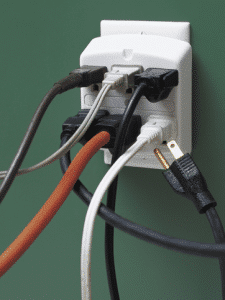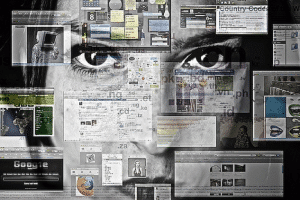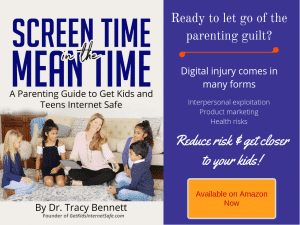
We love our Wi-Fi hotspots for Internet connectivity practically everywhere we go. But do you ever wonder if Wi-Fi radio wave exposure is dangerous? Here’s a quick and dirty GKIS crash course on the magic that is Wi-Fi, and its possible impact on the brain and body.
How Often Are We Exposed to Wi-Fi?
The average American spends eight hours and forty-one minutes a day on screen devices, with Wi-Fi-dependent mobile devices making up most of that time.[1] The demand for increased Wi-Fi availability and speed has caused nations to vastly increase production, which will ultimately increase mobile device use for all ages.
In India, for example, the government is working on a 1,050 hotspot Wi-Fi program that is estimated to cost $62 billion.[2]
What is Wi-Fi?
Wi-Fi, or wireless fidelity, is a wireless technology that uses radio waves to transmit information across a two-way wireless network, information received from the Internet, and from the Wi-Fi-enabled electronic device. Smartphones have adapters that translate data into a radio signal, which is then sent to a decoder, called a router.
Every router has a unique IP address. Once the data is decoded by the router, it is first sent to the Internet through a wired Ethernet connection. Returning data from the Internet will pass through the router a second time for decoding, then on to the smartphone’s wireless adapter.[3] Wi-Fi-enabled devices include smartphones, gaming devices, tablets, printers, appliances, toys, cars, and computers.
Low- and High-Intensity Radiation
There are two kinds of radiation, ionizing and non-ionizing. Ionizing radiation is the high-intensity radiation that is emitted from x-rays and nuclear bombs that is strong enough to penetrate our cells and damage our DNA.
The radiation emitted by Wi-Fi-enabled devices is non-ionizing radiation. It is the same low-intensity radiation that is emitted by the sun. Cancer research has clearly shown that the radiation from the sun can harm you. However, the sun’s radiation is at a vastly higher level than the radiation emitted from our Wi-Fi devices.
Old smartphones used 2G, 3G, and 4G technology (ranging from 800 megahertz (MHz) to 27 gigahertz (GHz). 5G technology ranges from 600 MHz to 39 GHz. Lower radio frequencies penetrate the body more than higher radio frequencies. Current safety standards limit smartphones to a maximum of 1.6 watts per kg, which is not enough to warm the body.[4] If your smartphone gets hot, it’s the battery heating up, not the radiofrequency.
Are Wi-Fi Radio Waves Dangerous?
The World Health Organization (WHO) has classified mobile phones as a “possible carcinogen,” meaning that current research is not conclusive enough to show that cell phone radiation does or does not cause cancer.[5]
A study conducted in 2015 revealed that rats who were exposed to high levels of cell phone radiation were at higher risk for developing brain and heart tumors. However, it’s important to realize that the radiation used in this rat study was much higher than the radiation experienced when on the phone or using Wi-Fi.[6]
Other studies have shown that high levels of Wi-Fi exposure cause hormonal shifts and oxidative stress, which can promote cancer and brain diseases.[6] High exposure to Wi-Fi has also been hypothesized to cause neurodevelopmental issues and reproductive harm in humans, especially among the vulnerable like pregnant women and children.[5]

Security Risks
The ability to connect your device to the Internet via Wi-Fi has allowed us to be more productive on the go. However, utilizing unsecured Wi-Fi sources exposes us to hacking dangers.
If there are a username and password on the network, then you are using a secured network. This network can be hacked but requires more work.
An unsecured network that is free to access without a password, as you would find at your local coffee shop, is riskier. When you connect to an unsecured Wi-Fi network your device’s IP address can be seen, which is how hackers infiltrate your device. Once the hacker has infiltrated your device, they can add malware or steal personal information.

How to Limit Wi-Fi Risk
- Employ common-sense safety measures like not sleeping with your phone by your bed, not storing your phone in pockets near your heart or reproductive organs, and keeping routers out of the bedroom. Also, use your headphones or a Bluetooth device if you spend many hours on your mobile phone.
- Track and set limits on how many hours you spend using Wi-Fi (time management apps can help).
- Use filtering, monitoring, and control apps with kids, especially to turn off phone activity while driving as we suggest in our GKIS Screen Safety Toolkit.
- Develop screen-free skills by setting time and blackout day limits, like GKIS #NoTechTuesday and #NoTechThursday as we suggest in our GKIS Connect Family Course.
- Only sign on to secure Wi-Fi sources.
- Avoid screen fatigue by limiting multitasking.
- Turn off Wi-Fi when not in use.
- Most of all, disconnect and spend time with the people you love doing things that are fun and rejuvenating.

I’m the mom psychologist who will help you GetKidsInternetSafe.
Onward to More Awesome Parenting,
Tracy S. Bennett, Ph.D.
Mom, Clinical Psychologist, CSUCI Adjunct Faculty
GetKidsInternetSafe.com
Works Cited
[1] Madlen D. (2015) Average person now spends more time on their phone and laptop than sleeping, study claims [2] Matthew H. (2017) The Indian government is spending $62 billion on Wi-Fi hotspots http://www.businessinsider.com/the-indian-government-is-spending-62-billion-on-wi-fi-hotspots-2017-1 [3] What is Wi-Fi and How Does it Work? (Sept. 2017) CCM. http://ccm.net/faq/298-what-is-wifi-and-how-does-it-workAmanda L. (2015) Teens, Social Media & Technology Overview 2015[4] Tontonoz M. (2019) Do Cell Phones Cause Cancer, Memorial Sloan Kettering Cancer Center News
[5] Markham H. (2016) You Asked: Should I Worry About Wi-Fi Radiation?
[6] Yüksel M, Nazıroğlu M, Özkaya MO. (2015) Long-term exposure to electromagnetic radiation from mobile phones and Wi-Fi devices decreases plasma prolactin, progesterone, and estrogen levels but increases uterine oxidative stress in pregnant rats and their offspring. Endocrine. 2015 Nov 14.http://www.pewInternet.org/2015/04/09/teens-social-media-technology-2015/
Andres J. (2012) One in Four Households In the World Use Wi-Fi http://www.huffingtonpost.com/2012/04/11/one-in-four-households-in-the-world-use-wi-fi_n_1419014.html
Carolyn G. (2013) How Technology Is Warping Your Memory
http://www.huffingtonpost.com/2013/12/11/technology-changes-memory_n_4414778.html
Ginny S. (2017) When Electronic Devices Become a Problem https://www.ghc.org/html/public/health-wellness/sugimoto/devices
Jack S. (2012) Wi-Fi: are there any health risks
https://www.theguardian.com/technology/askjack/2012/sep/27/wi-fi-health-risks
Kelley W. (2016) Half of teens think they’re addicted to their smartphones
http://www.cnn.com/2016/05/03/health/teens-cell-phone-addiction-parents/index.html
http://time.com/4508432/what-is-wifi-radiation-cancer/
Rob W. (2012) Internet addiction can cause physical damage to the brain, just like drugs, says researchers http://www.dailymail.co.uk/sciencetech/article-2085369/Internet-addiction-cause-physical-damage-brain-just-like-drugs-say-researchers.html
Weng, Chuan-Bo et al. (2013) Gray matter and white matter abnormalities in online game addiction European Journal of Radiology , Volume 82, Issue 8, 1308 – 1312
Photo Credits
Holiday Fire Safety – Overloaded electrical outlet State Farm, CC BY 2.0
Internet addiction Federico Morando, CC BY-NC-ND 2.0
Don't worry, we will never spam you.









